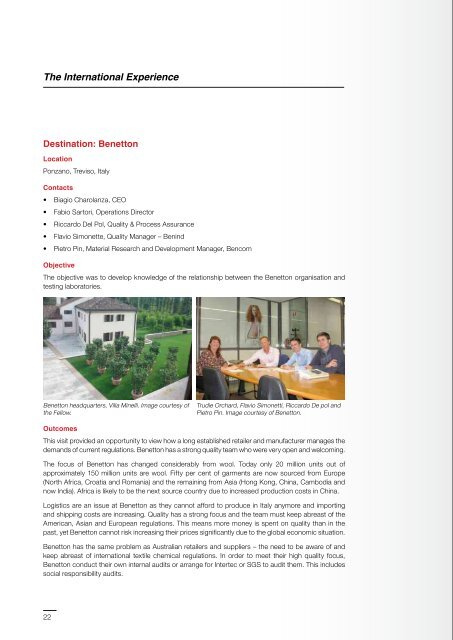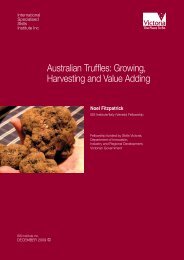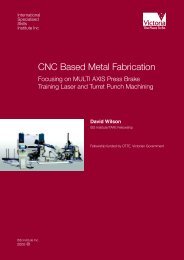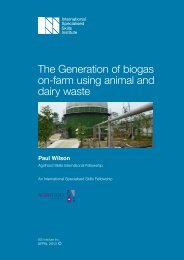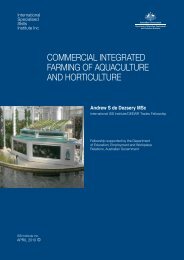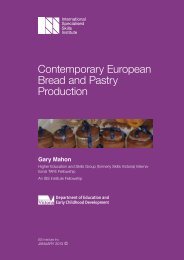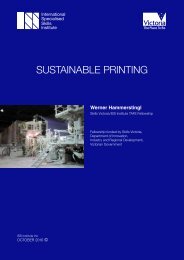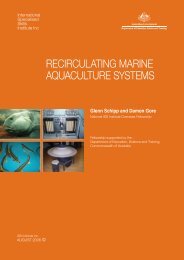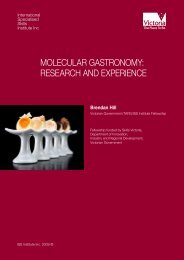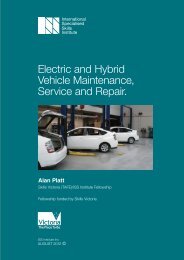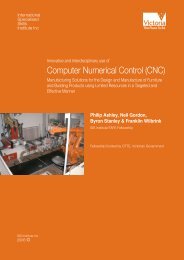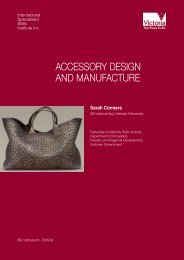Evaluating Sustainability of Textiles in Europe ... - Blockshome.com
Evaluating Sustainability of Textiles in Europe ... - Blockshome.com
Evaluating Sustainability of Textiles in Europe ... - Blockshome.com
- No tags were found...
You also want an ePaper? Increase the reach of your titles
YUMPU automatically turns print PDFs into web optimized ePapers that Google loves.
The International ExperienceThe International ExperienceDest<strong>in</strong>ation: BenettonLocationPonzano, Treviso, ItalyContacts• Biagio Charolanza, CEO• Fabio Sartori, Operations Director• Riccardo Del Pol, Quality & Process Assurance• Flavio Simonette, Quality Manager – Ben<strong>in</strong>d• Pietro P<strong>in</strong>, Material Research and Development Manager, Ben<strong>com</strong>ObjectiveThe objective was to develop knowledge <strong>of</strong> the relationship between the Benetton organisation andtest<strong>in</strong>g laboratories.They have a strong focus on tra<strong>in</strong><strong>in</strong>g suppliers to work <strong>in</strong> a safe way. For example, when us<strong>in</strong>g specificdyes they tra<strong>in</strong> dyers not to cross contam<strong>in</strong>ate dyestuffs by us<strong>in</strong>g different scoops for different dyestuffs.It was <strong>in</strong>terest<strong>in</strong>g to learn that whilst Benetton requests check<strong>in</strong>g aga<strong>in</strong>st Oeko-Tex® Standard 100regulations and makes a po<strong>in</strong>t to verify all Oeko-Tex® Standard 100 certificates with the delivery <strong>of</strong>goods, they do not use the Oeko-Tex® Standard 100 label as it is expensive.Whilst they want to be sure the product is chemical free, they feel this additional label distracts from theBenetton label with no market<strong>in</strong>g advantage.Dest<strong>in</strong>ation: Gruppo Co<strong>in</strong> SpALocationMestre, ItalyContactGiordano Artuzzi, Quality Assurance Department ManagerObjectiveThe objective was to develop an understand<strong>in</strong>g <strong>of</strong> the relationship between Gruppo Co<strong>in</strong> SpA (Co<strong>in</strong>)and test<strong>in</strong>g laboratories.Benetton headquarters, Villa M<strong>in</strong>elli. Image courtesy <strong>of</strong>the Fellow.Trudie Orchard, Flavio Simonetti, Riccardo De pol andPietro P<strong>in</strong>. Image courtesy <strong>of</strong> Benetton.Out<strong>com</strong>esThis visit provided an opportunity to view how a long established retailer and manufacturer manages thedemands <strong>of</strong> current regulations. Benetton has a strong quality team who were very open and wel<strong>com</strong><strong>in</strong>g.The focus <strong>of</strong> Benetton has changed considerably from wool. Today only 20 million units out <strong>of</strong>approximately 150 million units are wool. Fifty per cent <strong>of</strong> garments are now sourced from <strong>Europe</strong>(North Africa, Croatia and Romania) and the rema<strong>in</strong><strong>in</strong>g from Asia (Hong Kong, Ch<strong>in</strong>a, Cambodia andnow India). Africa is likely to be the next source country due to <strong>in</strong>creased production costs <strong>in</strong> Ch<strong>in</strong>a.Logistics are an issue at Benetton as they cannot afford to produce <strong>in</strong> Italy anymore and import<strong>in</strong>gand shipp<strong>in</strong>g costs are <strong>in</strong>creas<strong>in</strong>g. Quality has a strong focus and the team must keep abreast <strong>of</strong> theAmerican, Asian and <strong>Europe</strong>an regulations. This means more money is spent on quality than <strong>in</strong> thepast, yet Benetton cannot risk <strong>in</strong>creas<strong>in</strong>g their prices significantly due to the global economic situation.Benetton has the same problem as Australian retailers and suppliers – the need to be aware <strong>of</strong> andkeep abreast <strong>of</strong> <strong>in</strong>ternational textile chemical regulations. In order to meet their high quality focus,Benetton conduct their own <strong>in</strong>ternal audits or arrange for Intertec or SGS to audit them. This <strong>in</strong>cludessocial responsibility audits.Out<strong>com</strong>esAs a sub-<strong>com</strong>mittee member <strong>of</strong> an organisation that contributes to the development <strong>of</strong> ISO standards,Giordano Artuzzi understands the need for regulation and adherence to strict test<strong>in</strong>g protocol. Co<strong>in</strong>requires that test<strong>in</strong>g laboratories <strong>in</strong> Italy are members <strong>of</strong> System Italiano Nazionale Accreditamento DiLaboratri (SINAL), an association equivalent to NATA <strong>in</strong> Australia. Other laboratories used by suppliersmust be ISO 17025 accredited such as Intertek <strong>in</strong> Florence.In addition to supply<strong>in</strong>g apparel to the local market, Co<strong>in</strong> exports to America and Ch<strong>in</strong>a, sourc<strong>in</strong>g 25%<strong>of</strong> fabrics from Italy and 60–70% <strong>of</strong> fabrics from Ch<strong>in</strong>a, India and Taiwan. As with Benetton, Co<strong>in</strong> hasfound the biggest issue with sourc<strong>in</strong>g from these regions is the need to tra<strong>in</strong> the supplier to understandthe regulations. Emphasis <strong>in</strong> this area has <strong>in</strong>creased significantly <strong>in</strong> the past two years.Initially Co<strong>in</strong> accepted signed documents that stated the goods did not have any harmful substances,however, this is no longer acceptable. Co<strong>in</strong> has developed a package <strong>of</strong> tests that <strong>in</strong>corporate therequirements <strong>of</strong> Ch<strong>in</strong>a, India and the EU regulations. There is a greater emphasis placed by Co<strong>in</strong> onthe chemical tests for adherence to their RSL. If a <strong>com</strong>ponent fails the chemical test, the whole ordermust be replaced by the supplier.At Co<strong>in</strong> Oeko-Tex® Standard 100 labels are applied to children’s wear only as Artuzzi believes thatonly 20% <strong>of</strong> Italians understand or require Oeko-Tex® Standard 100 labell<strong>in</strong>g so it is not as importantfor Co<strong>in</strong> at this stage. In addition the quantity <strong>of</strong> labels <strong>in</strong> the marketplace is confus<strong>in</strong>g for consumers.Co<strong>in</strong> is concentrat<strong>in</strong>g on the requirements set out by REACH as new chemicals are be<strong>in</strong>g <strong>in</strong>troduced<strong>in</strong>to the regulations. Co<strong>in</strong> is a retailer not dissimilar to the large Australian retailers, that also stocksand sells many non-textile products that may <strong>in</strong>clude chemicals outl<strong>in</strong>ed <strong>in</strong> the substances list puttogether by REACH.2223


